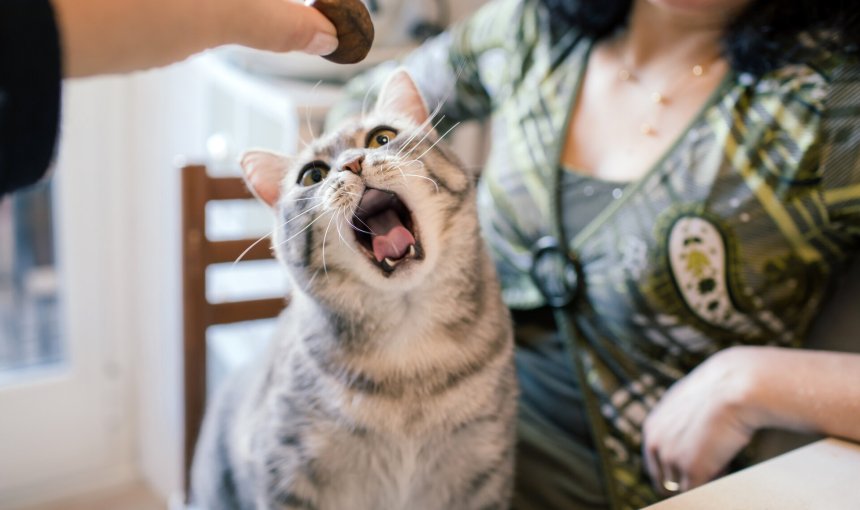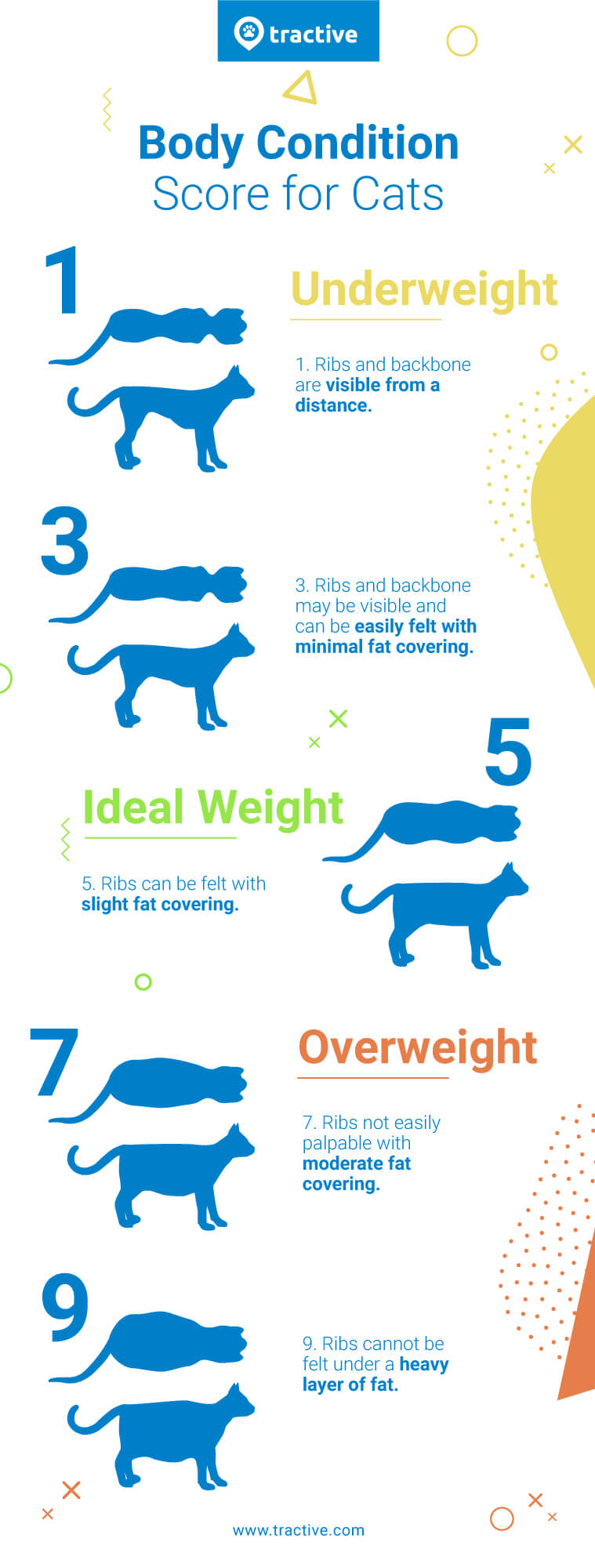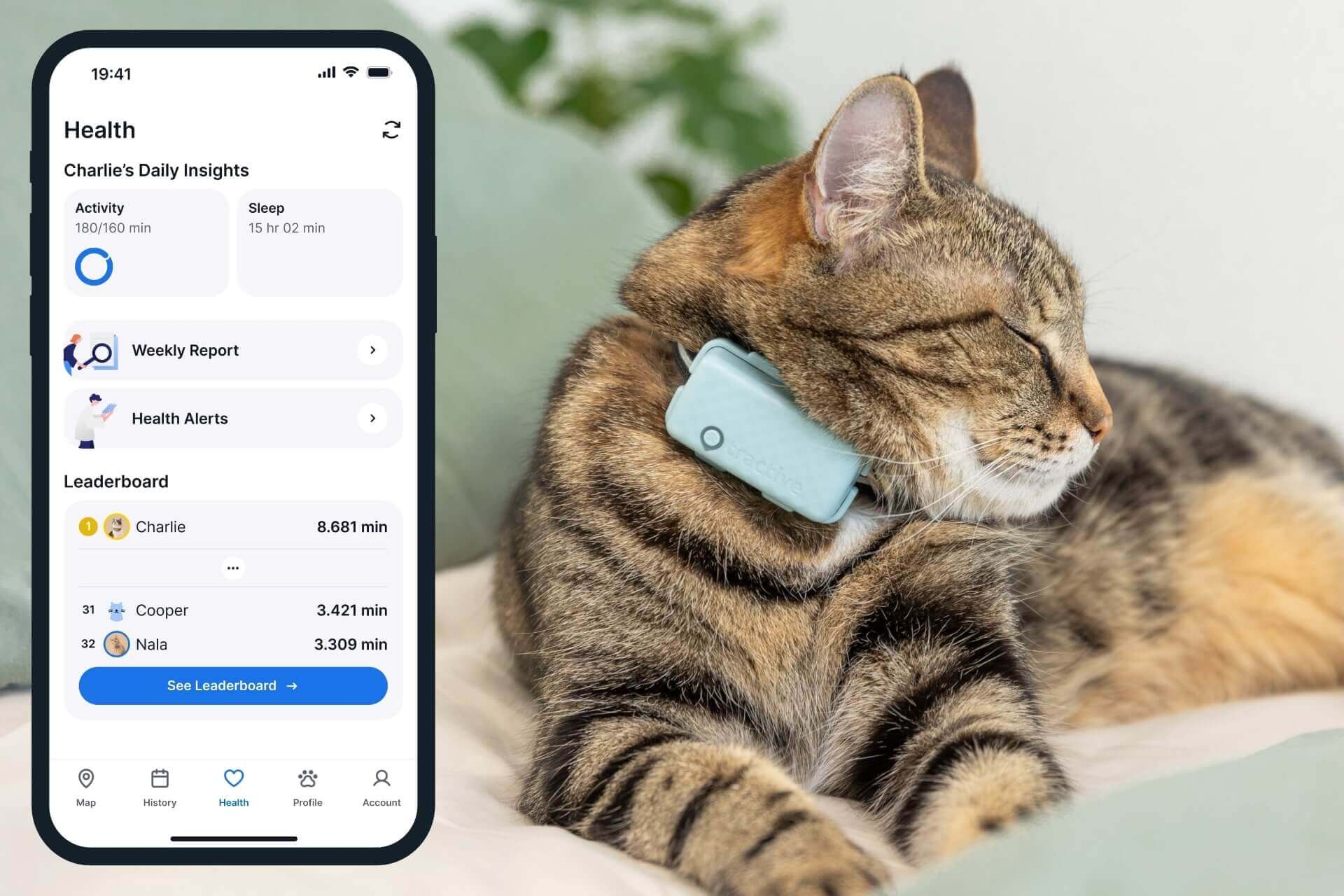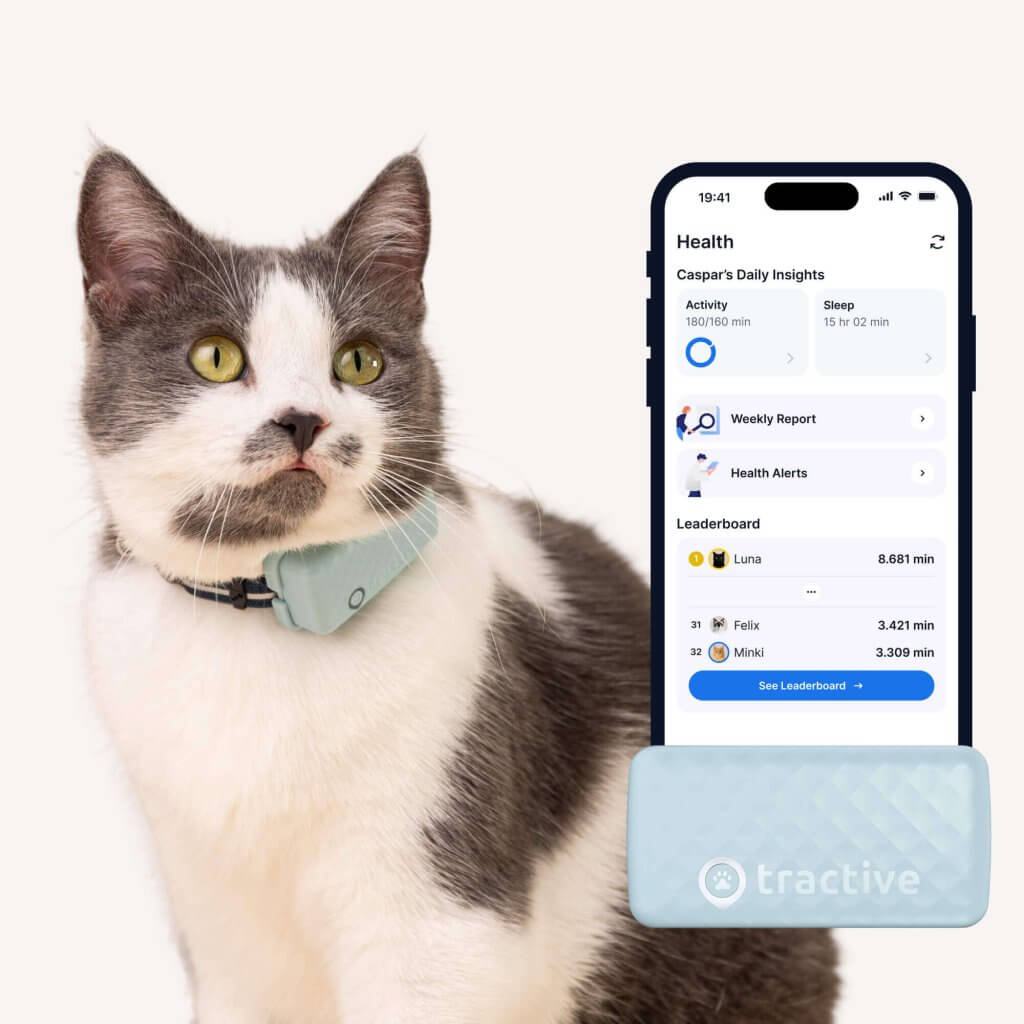 Approved by Dr. Dwight Alleyne, DVM
Approved by Dr. Dwight Alleyne, DVM Why Is My Cat Always Hungry? (And When To See A Vet?)
You've fed your cat, given them their treats, and the some more...but you're still wondering, why is my cat always hungry? Here's where it is (and isn't) a cause for concern.

Like any loving cat parent, you’ve likely spent a small fortune on the highest quality cat food…only to find your feline buddy meowing endlessly and demanding more – even after you’ve fed them. So if you’ve landed here, wondering why is my cat always hungry? – you wouldn’t be the first. Here are all the reasons you might be dealing with a hungry cat – and how a smart cat collar can help you keep them at their healthiest weight.
Key Takeaways
Hunger can be behavioral or medical.
A cat might seem always hungry due to behavioral issues like boredom or stress. Else, it could be a sign of a more serious medical condition – including hyperthyroidism, diabetes, or parasites.
Address any behavioral causes first.
Make sure not to skip playtime with your cat, use puzzle feeders, or feed cats separately. Also check if your cat’s current portion sizes are enough for their age and activity level.
A vet visit is necessary for medical concerns.
Head over for a checkup if your cat is constantly hungry but is also losing weight. This can be a key sign of an underlying health problem.
Use a smart cat collar with Health Monitoring.
Your Tractive device can help you figure out how much activity your cat is getting throughout the day – along with their calories burned. So you can make sure they’re getting fed just the right amount to stay at a healthy weight.

Find out where your cat spends their time.
Read moreMy cat is always hungry and meowing – what gives?
Behavioral issues can also play a role in why your cat seems perpetually hungry. So if your cat is constantly meowing at you and demanding food, it could be due to:
- Stress or anxiety
Much like people, cats can learn to connect “food” to “comfort.” So it’s possible they’ve learned to demand snacks as a way to cope with any stress or anxiety. If you’ve shifted apartments or brought home a new pet or baby, it could be stressful for your cat. - Boredom
Your cat might be demanding more food because they’ve gotten used to you giving them attention around mealtimes. Regular playtime, puzzle feeders, and interactive toys can help keep them occupied otherwise. - Competing for food
One of your cats with a more, well, dominating personality might be stealing food from your other cats. Competing for food this way might lead one or more of your cats to overeat as a result. I.e., they might eat more quickly or demand more food for fear the “bully” will take away their food. Try feeding your cats separately – at different times or in different parts of your house. (Each with their own food bowl.) This can help put an end to any food-hoarding or bullying behaviors. - Not getting enough food
Your cat’s portion sizes might not be enough for their age, weight, activity level, or current health status. Your vet can best advise you on the right amount of food to give your cat and how to adjust their portion sizes without any unnecessary weight gain.
Read more: Cat Feeding Schedule: How Often Should I Feed My Cat?
Medical reasons why your cat might seem hungrier than usual
You’ve helped them de-stressed, gotten them some new toys, adjusted their portion sizes…and you’ve still got a hungry cat at home? It could be due to certain medical conditions as well.
Including:
| Medical condition | Which might show up as: |
| Hyperthyroidism Your cat’s thyroid glands produce too much of the thyroid hormone, which speeds up their metabolism. | – Weight loss despite eating more – Increased thirst – Hyperactivity – Sometimes, vomiting and diarrhea |
| Diabetes mellitus Your cat’s body isn’t producing enough insulin – or not using insulin effectively, leading to high blood sugar levels. | – Increased thirst – Frequent urination – Weight loss |
| Intestinal parasites Including worms, which steal nutrients from your cat’s food. So your cat isn’t able to digest any food it eats properly. | – A “pot-bellied” appearance – Dull coat – Blood in stool – Lethargy |
| Inflammatory Bowel Disease (IBD) Where the lining of your cat’s gastrointestinal tract gets inflamed. This affects how well their body absorbs nutrients from their food. | – Chronic vomiting and diarrhea – Weight loss |
| Pancreatic insufficiency Where your cat’s pancreas doesn’t produce enough digestive enzymes, which can affect digestion and nutrient absorption. | – Weight loss – Greasy or foul-smelling stools |
⚠️ Notice how many of these conditions involve weight loss as a symptom?
It’s why it makes sense to monitor your cat’s weight to see if they don’t seem to be gaining any more weight despite eating more. This is one of the first signs something might not be right and that you should bring your cat to a vet right away. Here’s a handy cat BMI calculator to help you get a picture of whether your cat is underweight, overweight, or at a healthy weight. Else, you could also use their body condition score as a reference, in case you don’t have a weighing scale at home.
Steps you can take to monitor your cat’s every morsel
If your cat spends any amount of time outdoors – even in your backyard or neighborhood – there’s always the chance they could be getting some extra treats from neighbors, rummaging through the trash, or even hunting smaller animals. All of which can open up their risk of eating something off-limits, poisonous, spoiled, or even fatally toxic to cats. Here are some steps to help you monitor your cat’s every morsel.
Stick to regular mealtimes
This can help your cat regulate their hunger, especially if they’re used to eating at specific times of day. Try and feed them around the same time everyday without much change. Else, you could also break up your cat’s meals into smaller portions throughout the day. It’s a neat way to “trick” their brains into thinking they’re still eating – while not compromising on calories. An automatic feeder can help with this, especially if you’re away from home.
Your vet can best advise you on what types of cat food might be the most filling and hydrating. Wet cat food, for example, has more water content – which could help keep your cat fuller and more satiated throughout the day. Also, make sure your cat is drinking enough water throughout the day as well – especially in the hotter months.
Read More: Cat Feeding Schedule: How Much Should I Feed My Cat?
Set some firm boundaries with friends, family & neighbors
In general, snacks and treats shouldn’t account for more than 10% or so of your cat’s overall calories. Over-feeding your cat (especially on the sly) can lead to increased begging behavior, weight-gain realted health conditions like diabetes and heart problems, or even the risk someone might end up accidentally poisoning your cat by mistake. So it makes sense to set some ground rules when it comes to feeding a cat that’s “always hungry.” It could just be a learned behavior your buddy’s picked up from your easier-to-convince relatives!
Keep an eye on your cat’s weight
With weekly weigh-ins, you can check whether your cat’s diet and portion sizes are a bit much, a bit less, or just right for them. Normally, if your cat is eating the same amount of calories as they burn, it should help their hunger stabilize over time. But like we’ve also covered, a whole range of medical conditions can result in your cat eating more – but actually losing weight as a result.
💡Which you can catch on to earlier if you’re monitoring their weight and BMI to ensure they aren’t gaining or losing more weight than necessary. (Or their body condition score in case you don’t have a weighing scale.)

⚠️ Drop by your vet if you notice any unexplained weight loss in your cat despite no change in diet.
Where a smart cat collar can help
Figuring out how much to feed your cat can feel like a guessing game. (Especially when their “always hungry” routine makes you worry they aren’t getting enough food.) The reality is, a cat’s hunger can be a sign of many things, and overfeeding to satisfy that perceived hunger can lead to weight gain and serious health issues like diabetes and osteoarthritis. This is where a smart cat collar with Health Monitoring, like Tractive, can provide valuable data and peace of mind.

Now with just a glance at your phone, you can tell:
How much exercise your cat is getting
Your Tractive device comes with a built-in motion detector to monitor your cat’s movements – including active minutes and calories burned. This data, which takes into account your cat’s weight and other profile details, provides a much-needed baseline. By knowing exactly how much energy your cat is expending each day, you can adjust their food portions accordingly, ensuring they are getting the right amount of food to maintain a healthy weight without overdoing it.
Spot potential health issue early
Another crucial feature is Health Alerts. Tractive’s system learns your cat’s typical behavior and routine. If there’s a significant, long-lasting change in their activity or sleep patterns, the app will send you a notification. For example, a sudden drop in activity could be a sign of a health problem, while a decrease in sleep interruptions might be a positive sign. These alerts can help you spot potential issues early and provide a clear reason to consult your vet.
These combined features provide a comprehensive approach to managing your cat’s health and helping them live their best, healthiest life.

Get health alerts for your cat
Our cats can’t always tell us if something’s wrong. But if their tracker detects unusual changes in their routine, you’ll get an alert, helping you catch potential issues early.
And if you’ve liked this post, share it with a friend or a loved one – and let’s help build a safer, kinder world for our furry friends together.
Your furry friend’s health and wellbeing means as much as to us as it does to you. So we’ve made it a priority to only share medically-relevant content on our blog. This post was checked, double-checked, and medically verified by Georgia-based vet, Dr. Dwight Alleyne.

Dr. Dwight Alleyne, DVM
Originally from Long Island, New York, Dr. Alleyne began his career at a no-kill animal shelter before becoming a licensed veterinary technician. He graduated from Cornell University Veterinary College in 2006 and completed an internship at Purdue University. Now practicing in Georgia, Dr. Alleyne specializes in soft tissue surgery and ultrasounds. He also writes pet health articles on his website, “The Animal Doctor Blog” (www.anmldrblog.com).



